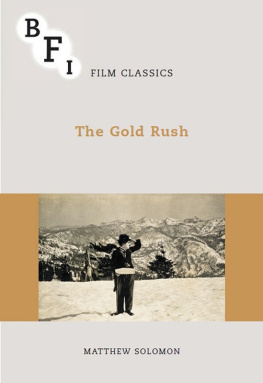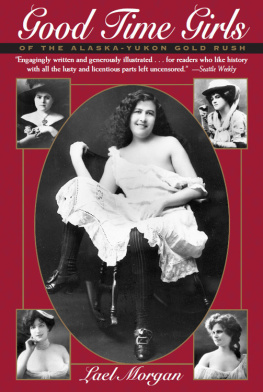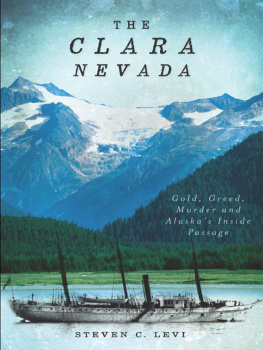GOLD FEVER IN THE 1890S
Adventures in Alaska and Five Continents
ROSEMARIE SCHULGA
PO Box 221974 Anchorage, Alaska 99522-1974
www.publicationconsultants.com
ISBN 978-1-59433-410-8
ISBN 978-1-59433-411-5
Library of Congress Catalog Card Number: 2013952222
Copyright 2013 Rosemarie Schulga
First Edition
All rights reserved, including the right of reproduction in any form, or by any mechanical or electronic means including photocopying or recording, or by any information storage or retrieval system, in whole or in part in any form, and in any case not without the written permission of the author and publisher.
Manufactured in the United States of America.
Thanks to Henry for his support and invaluable suggestions.
Introduction
Y oung Stefan set out on an adventurous path around the world to satisfy his gold fever and Wanderlust. As a miner and sailor he was able to follow his dream, traveling through five continents, beginning in Alaska in 1889. After nine years of travel, suffering many hardships, he ended up in San Francisco, where he recorded his adventures in a long letter to his parents in Wisconsin. The letter was written in Gothic script or Fraktur as it is called in German. This style of writing was taught in German schools until 1942 when on Hitlers orders it was discontinued. Fraktur was also taught in Wisconsin at the end of the 19th century to children of German ancestry.
In 1964 this long fascinating letter, dated 1898, came into my hands from a lady whom I assume was Stefans niece. She was unable to decipher the script and unaware that Fraktur was long outdated in Germany, when she asked me to translate it. Few German born citizens of my age were able to read or write the Gothic script, but she was in luck. Upon reading my translation the lady let loose a few derogatory remarks about the young man, exclaiming, I cant believe my uncle could have been smart enough to have written such an interesting letter! He was little thought of in the family. You must have improved on the translation. This remark puzzled me and intrigued me at the same time. I had formed a different opinion of this young man, who was plagued by a gold fever that lured him into seeking riches in many continents but failed to satisfy the expectations of his family.
Stefans experiences in the 1890s reveal a world on the brink of the radical changes brought about by the technological advances of the twentieth century. In Stefans world there were no airplanes, no automobiles, radios or telephones in general use. As a miner in Alaska, in South America, Australia, Africa, he often had to walk miles and miles to get to his destination. A letter to home would take weeks. The more formal manners and slower paced cultures of Stefans time contrast sharply with the world of today. The simple, pious Catholic faith which Stefan maintained through all his hardships is rather more exceptional today. It may appear surprising that Stefan was able to travel to so many lands, with scant resources and requiring no passports. One might wonder how he could have written such a very long continuous letter describing his adventures across five continents. He must have taken many notes during the nine years of his travels.
This novel has been constructed around the core of Stefans long letter. In presenting this account of his adventures and golden expectations, I have strayed little from the facts that he recorded in his letter, although it required considerable editing. A few of the numerous place names he cites remain obscure, where I was unable to check their spellings. I did find it necessary to clarify the content and fill in some of the descriptions, since his German had faltered after long disuse. The spirit and character of the story, however, remain uniquely Stefans.
There are strange things done, in the midnight sun
By men who moil for gold.
The Arctic trails have their secret tales
That would make your blood run cold..
(The Cremation of Sam McGee, Robert Service)
O n the verge of falling into a deep slumber, noble thoughts had given Stefan a taste of the greatness of spirit. Usually he was not blessed with lofty thoughts, because he was a man of action and hard physical work, a practical man. Thus it surprised him that he, Stefan Herzfeld was also capable of a higher kind of thinking. In this blessed illusion of the nocturnal hours he rediscovered in himself some splendid thoughts.
Time had taken a toll on him and at age 28 he felt like an old man with a broken body, though not with a broken spirit. From deep in the crevices of his mind almost forgotten memories awakened, taking him back to the time of his youth when he worried about the existence of his own soul. Then he had pondered about the meaning of Schillers poem Ode to Joy, which Beethoven had put to music. He had learned this poem An die Freude in his German language school in Wisconsin, and he remembered some of the lines:
Freude, schner Gtterfunken. Alle Menschen werden Brder.
(Joy, splendid sparks of the gods.all men shall be brothers.)
It was the meaning of the Gtterfunkensparks of the godsthat he could not quite grasp, but which led him Gold Fever in the 1890s now back to his own essential spirit, his own soul. He assumed that it must be paradise that Schiller had in mind.
With paradise on his mind, he was reminded of the stupendous beauty of the Aurora borealis, appearing so suddenly in the sky after many days of darkness. The pulsating splendor of colors illuminating the sky had brought joy to his heart, when his spirits had sunken to an all-time low and nearly hit rock-bottom in the frozen North of Alaska. This led him to question the presence of his own soul, as he witnessed this miracle that gave him courage to continue his venture in pursuit of gold.
Much later he became acquainted with a different interpretation of this phenomenon, which he heard about from the Eskimos. Evidently they regard the Aurora borealis as a spirit of the fortunate departed souls who play kickball. They also believe that the Northern lights are leading the souls of those recently departed to paradise. In the swishing noise that accompanies the phenomena, they hear voices of the spirits trying to communicate with them on earth. If the Eskimo intends to send a message to the dead spirits, they can do so by whispering to them. Stefan concluded that no matter what he thought of his own body there was always hope for his own soul. This realization pacified him and set him on the path to slumber, but a restless one at that. Maybe it was his own soul or spirit that guided him in his dreams on a path back to his roots, a farm in Wisconsin where he was born. Stefan felt there lay something wrapped in darkness that floated him back home, as if he had left behind some unfinished business.
The nocturnal hours were waning as Stefan dreamt that he had just finished milking the two cows. Carrying pails of milk, he stepped out of the barn into bright sunlight. He set the pails of milk down, trying to shelter his eyes from the bright sun, when the scent of sweet hay entered his nostrils, followed by a perfumed scent that reminded him of the yellow marigolds in his mothers flower patch. The strong pungent smell intensified, while a strong passion for his beloved Therese consumed him. He felt dizzy. Stefan could recognize the contours of her shape from her back as he approached her silently from behind, ready to put his arms around her; the marigold scent mingled with that of her own body odor and increased until it nearly drove him mad with desire for her. As he almost touched her, the image of Therese dissolved into thin air. In its place a dark ominous figure appeared and he awoke with a fright.









